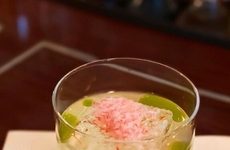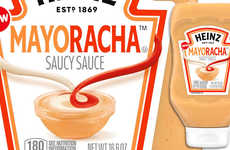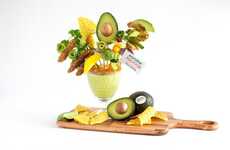
Creamy Japanese Mayogaritas
References: in.reuters
If you're ever in suburban Tokyo and you want to try something exotic, pop by the Mayonnaise Kitchen to sip back a "Mayogarita."
Maybe I'm just biased by the culture I grew up in, but a mayonaisse margarita sounds a little too unappetizing for my tastebuds. Usually mixers are intended to tame the tastes of liquor, but washing the hard stuff down with something even more shudder-worthy? Only in Japan!
The Japanese have mixed up this little cocktail, and the locals are loving it! The entire nation has an affinity for the creamy sandwich spread, and they don't go light on it either. Ironically, mayo originated in the Western world where it is now looked at (by most people) as a major calorie bomb. Asians, however, aren't so concerned about its choleterol-raising, artery-clogging associations and are adding it to everything from sushi to pasta and fondue. Mayo connoisseurs have even received their own nickname: "mayolers."
Reuters reported, "In 2006, Japanese consumed 1.65 kg of mayonnaise per person, down from a peak of 1.90 kg in 2000."
Maybe I'm just biased by the culture I grew up in, but a mayonaisse margarita sounds a little too unappetizing for my tastebuds. Usually mixers are intended to tame the tastes of liquor, but washing the hard stuff down with something even more shudder-worthy? Only in Japan!
The Japanese have mixed up this little cocktail, and the locals are loving it! The entire nation has an affinity for the creamy sandwich spread, and they don't go light on it either. Ironically, mayo originated in the Western world where it is now looked at (by most people) as a major calorie bomb. Asians, however, aren't so concerned about its choleterol-raising, artery-clogging associations and are adding it to everything from sushi to pasta and fondue. Mayo connoisseurs have even received their own nickname: "mayolers."
Reuters reported, "In 2006, Japanese consumed 1.65 kg of mayonnaise per person, down from a peak of 1.90 kg in 2000."
Trend Themes
1. Mayo-based Cocktails - There is a growing trend in Japan of using mayonnaise as a key ingredient in cocktails, creating unique and creamy flavors.
2. Mayonnaise Culture - Mayonnaise is becoming a staple in Japanese cuisine, with the locals adding it to a variety of dishes, demonstrating a cultural shift in taste preferences.
3. Mayo Consumption - Japanese consumers have shown a steady decrease in mayonnaise consumption per person, indicating potential market opportunities for alternative mayo-based products.
Industry Implications
1. Cocktail Industry - The conventional cocktail industry can explore the integration of mayonnaise as a unique ingredient to create innovative and creamy drink experiences.
2. Food and Beverage Industry - The food and beverage industry can tap into the growing demand for mayonnaise in Japanese cuisine by introducing new mayo-based products or incorporating mayo into existing dishes.
3. Condiment Industry - The condiment industry can capitalize on the decline in traditional mayonnaise consumption in Japan by developing alternative mayo-based products that cater to changing consumer preferences.
3.9
Score
Popularity
Activity
Freshness















